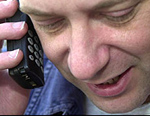A study was conducted at a medical conference in New Orleans this week, to see the effects of heavy usage of mobile phones. It was found that men, who are heavy users of mobile phones have lower sperm counts than usual and may also be at a risk of infertility.

The study was carried out among 361 men from the U.S. and India, who were divided into four groups, with 40 never suing a mobile, 107 men using them for less than two hours a day, 100 men using them for two to four hours daily, and 114 making calls for four or more hours a day.
“There was a significant decrease in the most important measures of sperm health and that should definitely be reflected in a decrease in fertility, which is seen worldwide,” said Dr. Ashok Agarwal, who led the study and is the director of the Reproductive Research Center in Ohio. “The main finding was that on all four parameters — sperm count, motility, viability and morphology — there were significant differences between the groups,” Agarwal added.
Agarwal further added that electromagnetic radiation emitted by handsets may be damaging cells that are vital to fertility. “These cells in the testes have been shown to be susceptible to electromagnetic waves in previous research in animals,” he said. “Somehow electromagnetic waves may be causing direct damage to these cells and that perhaps causes a decrease in sperm production.â€
There are also fears that a mobile phone may increase temperature in the groin if carried in the hip pocket. On this issue, Agarwal said, “Sperm is very temperature sensitive as show by many studies, and a short-term rise in temperature could be responsible.â€
In conclusion, Agarwal stressed that the study did not actually prove that mobile phones were damaging male fertility, as he said that they still have a very long way to go to prove this, and he urges scientists to investigate the possibility.
